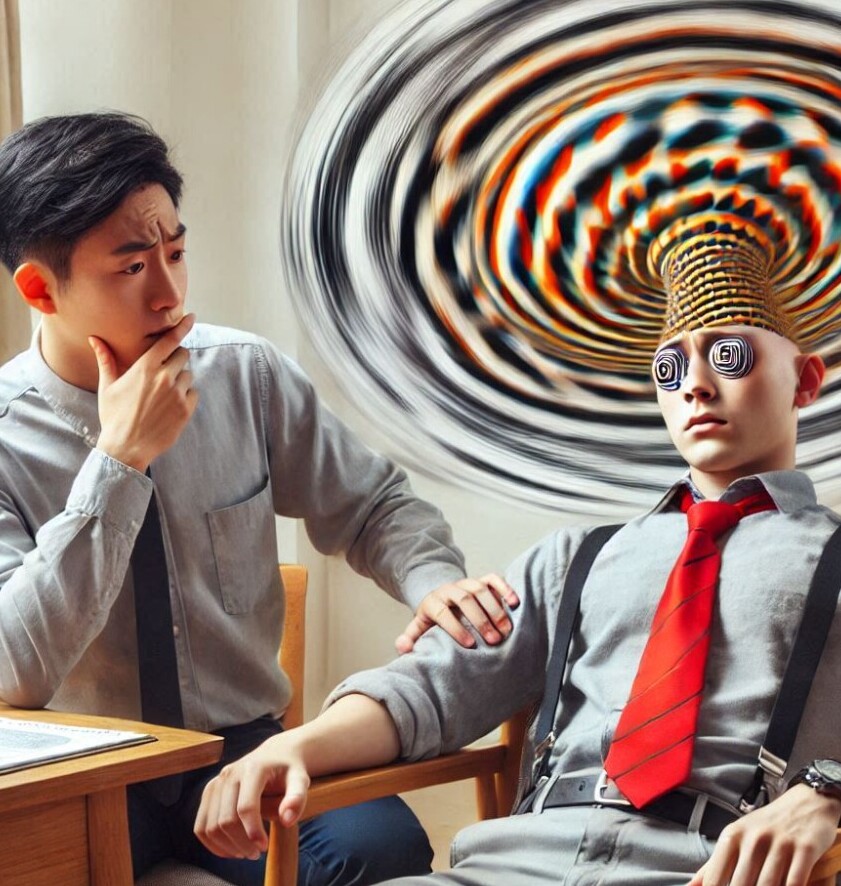Vertigo can hit you like a whirlwind, leaving you feeling dizzy and like the floor is shifting beneath your feet.
This spinning sensation can be incredibly unsettling, and it’s not uncommon to wonder what’s causing your balance to go awry.
For some folks, allergies might be the culprit behind these odd sensations. You might think allergies are just about sneezing and itchy eyes, but they can stir things up in the inner ear, too.
The inner ear plays a crucial role in keeping us steady, acting like a finely tuned balance system.
I am going to show exactly what happens when your allergies flare up, and how it can provoke vertigo or increase its severity.
Not just that—those pesky allergies might even mess with your hearing. Yep, there’s a connection between allergies and tinnitus, that annoying ringing in your ears.
But for now, let’s unravel how allergies might throw your balance off right here.
Understanding Vertigo: More Than Just Dizziness
Vertigo often gets tossed around as a synonym for plain old dizziness, but there’s a bit more to it. If you’ve ever felt like the world is spinning around you—while you’re standing still—that’s vertigo in action.

It’s like being on a merry-go-round that just won’t stop.
There are two main types of vertigo, each with different causes.
Peripheral vertigo comes from issues with the inner ear, which can be triggered by things like infections or inflammation. Then there’s central vertigo, rooted in problems with the brain or nervous system, often more complex and serious.
Understanding what’s triggering your vertigo is crucial because treatment hinges on it.
If it’s a peripheral case from something like inner ear trouble, especially if allergies are involved, managing those allergies could ease things up. If symptoms are leaning more towards central causes, well, that’s a whole different conversation and might need a deeper dive with a healthcare professional.
Recognizing the type of vertigo you might be dealing with helps in mapping out the effective steps to take next.
Resources from reliable medical platforms, like the Mayo Clinic, offer detailed insights into the symptoms and causes of vertigo, making them a great starting point for anyone needing a clearer picture.
Exploring the Connection: Can Allergies Cause Vertigo?
Allergies can do more than just make you sneeze; they might be throwing off your balance, too.
When your body encounters an allergen—be it pollen, pet dander, or dust—it releases histamines to fend it off.
This immune response can lead to inflammation not just in your nose, but in your Eustachian tubes as well. These tubes connect your throat to your middle ear, and when they swell or get blocked, it can mess with your ear’s ability to equalize pressure.
This abnormal pressure or fluid buildup can affect how your inner ear communicates with your brain about your body’s position, throwing your balance off and potentially leading to vertigo.
Imagine trying to walk straight on a rocky boat—that’s how your balance system gets thrown off kilter.
Allergic rhinitis and sinusitis often come up in discussions about allergy-induced vertigo. With allergic rhinitis, nasal congestion is common, and it can push pressure onto the inner ear. Sinusitis, particularly when chronic, can add to that pressure impact, making balance disruptions more frequent and troublesome.
Finding the link between your allergies and vertigo can be pivotal in managing your symptoms more effectively.
Tracking your allergy symptoms and noting when your vertigo flares up might give you a better idea of whether there’s a connection.
Symptoms Bridging Allergies and Vertigo
Beyond the swirling sensation, vertigo linked with allergies can bring along a whole ‘crew’ of other symptoms.
Tinnitus might make its annoying presence known, ringing in the ears while everything around you spins. This is often due to the pressure and inflammation clogging up your ear’s natural flow, possibly altering how you hear.
Nausea sometimes tags along with vertigo.
It’s no fun, but think about it: when your balance is off, your stomach often isn’t far behind. Some folks might also deal with a looming headache or even a sense of ear fullness—kind of like being deep underwater without getting wet.
These symptoms are windows into what’s happening inside your body, and linking them back to allergies could help you figure out a game plan.
Keeping tabs on when these symptoms appear and their severity could reveal patterns, pointing more toward allergens as the root cause.
Managing Allergy-Induced Vertigo: Treatments and Relief
Dealing with allergy-induced vertigo can be tricky, but several strategies can help you find some relief.
Medically, antihistamines are often your first line of defense, working to lessen allergic reactions by blocking histamines, the little troublemakers causing inflammation.
As a pharmacist, I recommend you keep some Cyclizine or Meclizine by your side. If possible, try visiting your doctor and ask him for some Serc or any antihistamines containing betahistine.
Decongestants can also come in handy to relieve nasal and ear pressure that contributes to that dizzy feeling.
For more severe vertigo, vestibular rehabilitation therapy—a specialized form of physical therapy—might be recommended to help retrain your balance system. This therapy is tailored to your specific challenges and can make a real difference over time.
Aside from medical treatments, there are also practical steps you can take at home.
Saline sprays or humidifiers can unclog nasal passages, providing relief from pressure. Also, trying to avoid known allergens in your environment, like dust, pollen, or pet dander, can make a noticeable impact on reducing symptoms.
For those juggling both vertigo and tinnitus, managing these conditions together is key.
Exploring how to handle tinnitus while tackling your allergy issues might provide a comprehensive approach, minimizing the impact on your daily life.

Consulting Professionals: When to Seek Help
Sometimes, figuring out vertigo on your own just doesn’t cut it, especially when the symptoms linger or worsen.
Persistent or severe vertigo, hitting hard without letting up, is a clear signal to get some expert advice.
If you’re experiencing hearing loss or ringing in your ears alongside vertigo, it might not just be the allergies.
These symptoms could point to underlying issues needing more than just at-home fixes. Pay special attention if the dizziness drags on for days without improvement.
Reaching out to an ENT (ear, nose, and throat) specialist or an allergist can make a world of difference.
These professionals have the tools and tests necessary to pinpoint the exact cause and suggest treatments that are right for you. They can also help distinguish between vertigo caused by allergies and other potential culprits, ensuring you get the most effective care.
Waiting it out isn’t the best option when your balance and hearing are at stake. Catching issues early by consulting a doctor not only helps in managing symptoms but also prevents them from escalating. It’s all about staying ahead and keeping your quality of life on track.
The Role of OTC Hearing Aids in Vertigo-Related Hearing Symptoms
Hearing loss or tinnitus can sometimes accompany vertigo, especially when allergies are involved.
Investing in an over-the-counter (OTC) hearing aid might be a game-changer here, providing ample relief from those pesky ringing sounds or mild hearing loss tendencies triggered by vertigo-related conditions.
OTC hearing aids have grown more popular due to their accessibility and affordability. They can enhance sound clarity, making life a little less noisy yet clearer, even if ear-related challenges come and go with allergic reactions. It’s worth exploring these devices if you’re tired of the constant buzz and want a slice of peace.
Trying out different OTC models lets you find one that suits your needs and budget.
I have written reviews of OTC hearing aids like the Audien Atom or the Vivtone Rechargeable Hearing Aids.
Besides being relatively simple to use, OTC hearing aids often come with features like volume control and noise reduction, all contributing to an improved hearing experience. They can help manage the impacts of vertigo and tinnitus, helping you feel more at ease—even when those spins kick in.
Having extra tools like these up your sleeve can be empowering, letting you regain a sense of normalcy as you navigate through the ups and downs (literally) of living with vertigo, especially when allergies are pulling the strings.

Bringing It All Together: How To Deal With Allergies and Vertigo
So, we’ve taken a solid look at how allergies might be adding to your vertigo woes. Allergies affecting your inner ear can make life a dizzy ride, but knowing how they intertwine gives you a head start in tackling symptoms.
Seeking professional advice remains crucial.
A doctor’s insight can differentiate basic allergy-induced vertigo from more complex conditions, leading to a tailored approach that keeps you steady on your feet.
Managing allergies is part of the equation.
Whether it’s through medical treatments like antihistamines or practical measures like avoiding allergens, every step counts.
And let’s not forget those handy OTC hearing aids that might just smoothen the path when tinnitus or hearing fluctuations enter the scene.
As you journey through understanding your unique blend of symptoms, remember: that you’re not alone.
There’s plenty of support and resources on hand to help manage and minimize the impact on your day-to-day life. This understanding is not just about coping; it’s about thriving, despite the spinouts.
I hope that you enjoyed this read on vertigo and allergies. What about tinnitus, can it cause vertigo? Check out my article on whether or not Tinnitus can cause vertigo.
Have you experienced vertigo or dizziness? Was your case just a random experience, or was it a deeper underlying cause?
Looking forward to hearing from you.
Regards and Take Care
Roopesh



This article does a great job of explaining the connection between allergies and vertigo—something I hadn’t considered before. It’s fascinating how inflammation in the Eustachian tubes can disrupt balance and even contribute to tinnitus.
I’ve experienced vertigo during allergy season and didn’t realize it could be related until my doctor suggested it. Using a humidifier and keeping windows closed during high pollen counts helped me manage the symptoms. Have others found similar strategies effective?
I also wonder if certain allergens, like pollen, are more likely to trigger vertigo compared to others like pet dander or dust mites. Additionally, how quickly do antihistamines typically work to relieve these symptoms, and are there any downsides to using them long-term?
Thank you for your kind words and for sharing your experience! It’s amazing how something as common as allergies can impact balance and even contribute to tinnitus. Using a humidifier and closing windows during high pollen counts are great strategies—many readers may find that helpful too!
As for allergens, pollen does seem to be a common trigger for vertigo, but pet dander and dust mites can also play a role, depending on the individual. Antihistamines usually work within 30 minutes to a few hours, but long-term use can sometimes cause drowsiness or dry mouth, so it’s best to consult a doctor for personalized advice.
Thanks again for adding to the conversation!